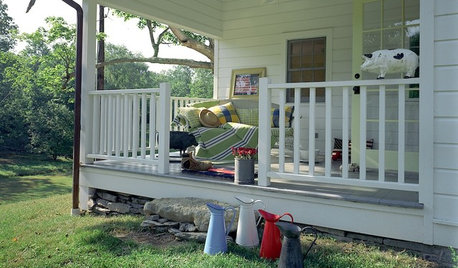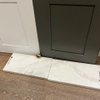Not allowed to pull my own permits.
aapl
12 years ago
Featured Answer
Comments (24)
renovator8
12 years agoRelated Discussions
Did you use GC? Did you pull permits?
Comments (5)We are doing that and getting permits for all of the above reasons. We're reconfiguring the kitchen so we'll be moving lines. Plus, we were worried that if something went wrong after the reno our home insurance might not cover an accident if the changes didn't have a permit However, we were told that for a basement, if it's just a box (vs. putting in a bedroom or kitchen), then you didn't really need a permit. Also, some towns have a grandfather clause in where if they discover it after say, 6 years and it hasn't violated any codes than it is considered OK. This was in the context of the basement box only, not a kitchen or some place where you're moving plumbing, electrical, gas, etc. You should ask your real estate lawyer a lot of questions about the permits and what was done, what you're planning to do. On the reno, if you've done some before and are savvy and don't mind all of the coordination, you could hire your own plumber, your own electrician, your own floor guy, etc. and try to coordinate them. But one little mishap can screw up the whole chain. We are using a GC, since we don't have a favorite electrician or plumber and have never done a renovation of this scale. We might use our own floor guy and possibly painter. What I've discovered is some GCs have better design ability than others which could enable you to skip a separate designer/architect. Good luck! Enjoy the new home...See MoreDoes anyone decide to not pull permits?
Comments (64)I don't think it's unreasonable to ask for permits when purchasing a house, especially one with questionable attributes. My city was able to produce them going back to 1961. Whether or not the inspector is useful varies, but what the threat of an inspection does is make the guy doing the work know that potentially someone who knows something more than the homeowner could maybe possibly look at it. Anyway, it's the law. I'll break it myself, but I'm not gonna pay someone to break it. After I remodeled my kitchen in my last home, my assessment didn't increase. (Actually it dropped thanks to the whims of the housing market but it wasn't reassessed due to the same-footprint remodel.) In my current house, we've only done maintenance stuff (roof, pool work, etc.). Just like our previous jobs, inspectors didn't give a darn about anything but what they were inspecting--except for CO detectors. They didn't actually look. They just asked....See MoreGC asking us to pull electric+plumbing permits
Comments (50)One other reason I'd recommend a homeowner not pull the permits for electrical, plumbing, etc, on behalf of a sub or a GC. "Open permits". The following mayor may not apply. And yes, the points can be parsed to death. And no, the AHJ may not choose to use their leverage to help out a homeowner. I'm just telling a story. Let's say for whatever reason, the job fell apart. In my area, if the homeowner pulled the permit and the job languished and for whatever reason the job was never fully signed off and the permit was never closed by the AHJ, the homeowner is on the hook for getting the work complete, the final inspections done, and closing the permit. If an electrician pulled the permit and the job fell apart and the permit was never closed and the permit remained open for an extraordinary length of time, the town has the leverage to not issue any more permits in the electrician's name until the languishing permit was closed. That gives the electrician incentive to get the work done, get the permit closed, and to move on. No, it's not binding. Yes, there are ways around it. As there are with everything. But it's a small way for the AHJ, if they choose to do so, to act on behalf of a homeowner if things go awry. Some people use "open permits" as a way of vetting subcontractors. They'll call the building office and ask if Joe Blow has any permits that have been open longer than X months. If someone has a string of them, it may be prudent to ask them why prior to hiring them. Again, it's not true protection. It's just another thing to have in your hip pocket. Just in case....See MoreContractor did not pull permit
Comments (60)Joseph Corlett: I find it sad to say but many of the tech kids make a whole lot more than that and lots even have incentive stock options that can be worth tens of millions. I would say in general that it is impossible to live in the Bay Area "comfortably" (from Marin to San Francisco, east to Contra Costa and Alameda, and south to San Mateo and Santa Clara counties). Any further than that is really pushing a commute - and home prices reflect that. Also it seems that the building in the north and south bay has pretty much come to a standstill, also San Francisco, and I am not sure of the east bay (too much traffic for me to go there any time). My definition of "comfortable" would be $150K family household income minimum, more like $250K. When I moved here it was a lot less, but the Bay Area had not grown like it is now and turned into a tech nightmare. The people of lesser income all have to commute a great distance, etc. - and this is a serious problem. If there are any Bay area GC's here - please chime in as to how your employees can afford to live here? Not easily I assume - especially in the last 10 years. Why would they want to? So we have all these people who get jobs in all these tech companies and they cannot find a place to live. Most houses under $1M go into bidding wars, and probably $2M in the south bay. Many of these houses are sold needing work - and they all will need work eventually. When you are in multiple bid situations, there is very little pressure to fix things up to sell. The Realtors even tell you that. I am in Marin and have not seen much new construction in 10-15 years. That means all the houses are growing older - more broken- yet harder to buy. When we recently sold our "old" house in Marin - many of the offers came from people with very long commutes who were trying to shorten them (like presently living in Santa Rosa and commuting to San Mateo). You could tell from the offers that they had reasonable incomes and cash to work with but even that was not enough if they wanted to have kids (lots of Millennials). Most houses were sold with work to be done. The average age of a house in Marin must be from the 80's and the south bay from the 60's. Who is around to do this work. I have hear of people (kids of friends of ours) - waiting a year or more to get any work done. And they really needed it. Contractors to fix and remodel these homes are not easy to find. Good GC's are even harder to find. The contracting world becomes so blurred that you cannot tell the good from the bad. Places like "Homeadvisor.com" and Angies List" commonly suggest people (GC's and trade license) that are not really licensed. The Realtors tend to throw their "regular go to" people at you so you will be more eager to buy a house with a potential roof problem, etc. Many Realtor referrals are nightmares. Basically, unless a property is seriously overpriced or has many bad problems - people will grab them up. Even now it is likely a 2 month wait to get an experienced painter to do work. So the unlicensed people come in, generally are accidents waiting to happen, and people will hire them - not even asking to see a license, etc. The CSLB cannot enforce this - and are likely underfunded. California has too many laws on the books and it spreads state money pretty thin given our income tax rate is one of the highest in the country....See MoreChristopher Nelson Wallcovering and Painting
12 years agoEngineerChic
12 years agorenovator8
12 years agoGreenDesigns
12 years agoUser
12 years agosierraeast
12 years agobrickeyee
12 years agojonnyp
12 years agoaapl
12 years agosierraeast
12 years agobrickeyee
12 years agobsspewer
12 years agosierraeast
12 years agoworthy
12 years agojonnyp
12 years agobrickeyee
12 years agoUser
12 years agobrickeyee
12 years agojonnyp
12 years agorenovator8
12 years agojonnyp
12 years agobrickeyee
12 years ago
Related Stories

CONTRACTOR TIPSBuilding Permits: When a Permit Is Required and When It's Not
In this article, the first in a series exploring permit processes and requirements, learn why and when you might need one
Full Story
CONTRACTOR TIPSBuilding Permits: The Inspection Process
In Part 5 of our series on home building permits, we explore typical inspection schedules for a variety of project types
Full Story
CONTRACTOR TIPSYour Complete Guide to Building Permits
Learn about permit requirements, the submittal process, final inspection and more
Full Story
CONTRACTOR TIPSBuilding Permits: 10 Critical Code Requirements for Every Project
In Part 3 of our series examining the building permit process, we highlight 10 code requirements you should never ignore
Full Story
CONTRACTOR TIPSBuilding Permits: The Submittal Process
In part 2 of our series examining the building permit process, learn what to do and expect as you seek approval for your project
Full Story
CONTRACTOR TIPSBuilding Permits: The Final Inspection
In the last of our 6-part series on the building permit process, we review the final inspection and typical requirements for approval
Full Story
CONTRACTOR TIPSBuilding Permits: What to Know About Green Building and Energy Codes
In Part 4 of our series examining the residential permit process, we review typical green building and energy code requirements
Full Story
MORE ROOMSHouzz Rule: No Dogs Allowed?
If your home has a no-pets policy, here's what to do when guests arrive unexpectedly with a four-legged friend
Full Story
OUTBUILDINGSAdults Allowed: A Poolside Playhouse Makes Room for All
Sprightly but not saccharine, this adaptable backyard structure is equally at home with the grandkids and the grown-ups
Full Story
DECORATING GUIDESDesign Trends: Create Your Own Global Style
From Ikats to Chinoiserie, It's Easy to Put a Twist on Indian and Asian Design
Full Story



jasperdog